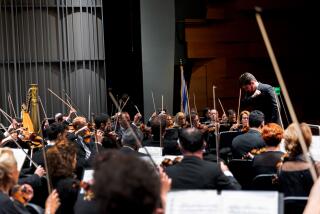It’s About Time for a Dose of Dvorak
- Share via
For at least three decades this writer has been bemoaning the inexplicable neglect--save for a few overplayed works--of Dvorak, this most fertile, accessible and lovable of composers.
With the publication of a complete Dvorak edition in the composer’s native Czechoslovakia in the 1960s, the situation began to improve somewhat. Subsequently, recordings of more than the half-dozen Dvorak standards began to appear, mainly on Supraphon, the Czech state label and one of communism’s finest and most profitable accomplishments, which permitted a wider public access to unfamiliar marvels.
Performers, in view of the endless critical griping about a shrinking repertory and impresarios’ ceaseless attempts to find other music that will not offend their conservative patrons, are enjoined once and for all to make Dvorak a part of their everyday diet.
If, however, we are to go by current recording activity, Dvorak has never been more popular, or better served.
Among recent arrivals, the palm goes to a set that should be as much an ear-opener for today’s novice Dvorakians as it was even for veteran partisans in the 1960s when its contents were released piecemeal: the nine symphonies, in performances by the London Symphony under Hungarian conductor Istvan Kertesz that are filled with the joy of discovery.
Kertesz (1929-1973) and his players captured the brilliance and soulfulness of the composer’s symphonic journey with a still hugely potent rightness, from the formal struggles of the first two, long-winded symphonies, to the wonderful tension created by Wagner, Brahms and a dimly perceived awareness of Czech folk idiom duking it out in the next two, to the growing populism of the Fifth Symphony and its triumph in the glorious Sixth, to the familiar splendors of the final trilogy.
The sound of the 1960s LSO remains a splendidly refreshing experience, as noted here recently in connection with the long-delayed appearance (on Vanguard) of its 1963 live Tchaikovsky program under Pierre Monteux.
Those bright-toned, athletic strings, cutting brass and taut timpani are constant delights here, as are the solo prodigies of Gervase de Peyer’s vibrant clarinet, Barry Tuckwell’s liquid horn and Roger Lord’s piercing oboe.
The recorded sound too retains its stunning immediacy, and the bargain-priced set (London 430 046, six CDs) includes valuable “filler” from the same artists: the concert overtures “My Home,” “In Nature’s Realm” and “Carnival” and the “Scherzo Capriccioso,” the latter with the Tuckwell-led horns in fullest, most jubilant cry.
Some Dvorak orchestral gems not included in the Kertesz package can be found in a mid-priced Deutsche Grammophon collection (435 074, two CDs) that returns to circulation mid-1970s performances by Rafael Kubelik and the Bavarian Radio Symphony.
The additional items are the tone poems “The Golden Spinning Wheel,” “The Midday Witch,” “Othello,” “The Water Goblin” and “The Wood Dove” and the Symphonic Variations--richly rhythmical, memorably melodic products of the composer’s maturity.
Kubelik’s readings are on the hectic side, and his German orchestra is no match for the Londoners. But there’s energy and affection here too. The set is recommended in the absence of the Kertesz/LSO versions of the same works, which, with the exception of “The Golden Spinning Wheel,” have not yet made it to CD.
A venerated practitioner of the Czech idiom, pianist Rudolf Firkusny, who recently celebrated his 80th birthday, returns to native soil with the two Dvorak Piano Quintets, both in the key of A: the youthful, wildly garrulous Opus 5 and the full-formed, magnificent Opus 81 (RCA 60436).
The liveliness and breadth of Firkusny’s Dvorak have remained undiminished over the years, and this version of Opus 81 is to be preferred to his poorly recorded earlier version (now on Sony CD) with the Juilliard Quartet.
His colleagues here are the youthful members of the Ridge Quartet, who deliver the technical proficiency and warmth of tone his masterful playing deserves.
More to Read
The biggest entertainment stories
Get our big stories about Hollywood, film, television, music, arts, culture and more right in your inbox as soon as they publish.
You may occasionally receive promotional content from the Los Angeles Times.










